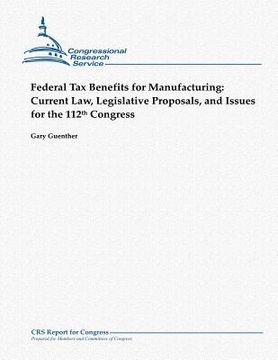Federal Tax Benefits for Manufacturing: Current Law, Legislative Proposals, and Issues for the 112th Congress (en Inglés)
Reseña del libro "Federal Tax Benefits for Manufacturing: Current Law, Legislative Proposals, and Issues for the 112th Congress (en Inglés)"
Congress is considering numerous proposals to create new forms of targeted assistance for the manufacturing sector. One of the more contentious issues in the policy debate concerns the role federal policy should play in the allocation of economic resources to and within the sector. This report examines a key element of current federal support for manufacturing: tax benefits. More specifically, it identifies and describes current federal tax preferences that offer significant benefits for small and large manufacturing firms. To broaden the context for the current policy debate over federal support for manufacturing, the report also provides a brief overview of federal non-tax support for manufacturing. In addition, the report identifies bills in the 112th Congress that would enhance current tax preferences and explains how eligible manufacturers might be affected. It concludes with a discussion of the chief arguments for and against additional targeted support for manufacturing and their implications for federal policy. Current federal tax law contains nine provisions with a strong potential to provide significant tax relief to firms primarily engaged in manufacturing. A few of them are targeted at manufacturing; the others tend to benefit manufacturers more than firms in most other sectors. The provisions include the deferral of the active income of controlled foreign subsidiaries of U.S.-based corporations, the research tax credit, the expensing of outlays for research and experimentation, and accelerated depreciation for certain capital assets. Numerous bills have been introduced in the 112th Congress that would enhance some of these tax preferences or create new ones. Among the notable proposals are H.R. 10/S. 1237, H.R. 689, H.R. 1036, H.R. 3476, H.R. 3495, H.R. 5727, S. 256, S. 825, and S. 2237. There is considerable variation among the bills in the extent to which they would benefit manufacturing firms. Several would extend and enhance the research tax credit, extend the generous depreciation allowances that were available in 2011, and allow a full exclusion for gains on small business stock. Proponents of targeted federal assistance for manufacturing make several arguments to back their stance. First, they say the assistance is needed to help the United States become more dependent on exports and domestic production as sources of economic growth. Second, a federal manufacturing policy, in their view, would encourage the creation of more manufacturing jobs, which pay higher wages and benefits, on average, than do non-manufacturing jobs. Third, proponents point out that manufacturing industries perform the vast share of private-sector research and development, and innovation is a primary engine of economic growth. Fourth, they note that manufacturing plays a critical role in the growth of the green economy. And because many foreign governments provide assistance to their manufacturers, say proponents, the United States should do the same to avoid a loss of competitiveness. By contrast, critics of special federal assistance for manufacturing say it is not warranted on economic grounds, since there is no discernible market failure that is peculiar to goods production. They also maintain that promoting job growth in manufacturing would do little to create the millions of jobs needed to achieve full employment again. Finally, in their view, the U.S. economy would benefit more from increased efforts by the federal government to dismantle foreign barriers to expanding U.S. exports of services than from policies aimed at boosting the competitiveness of U.S. manufacturers.

